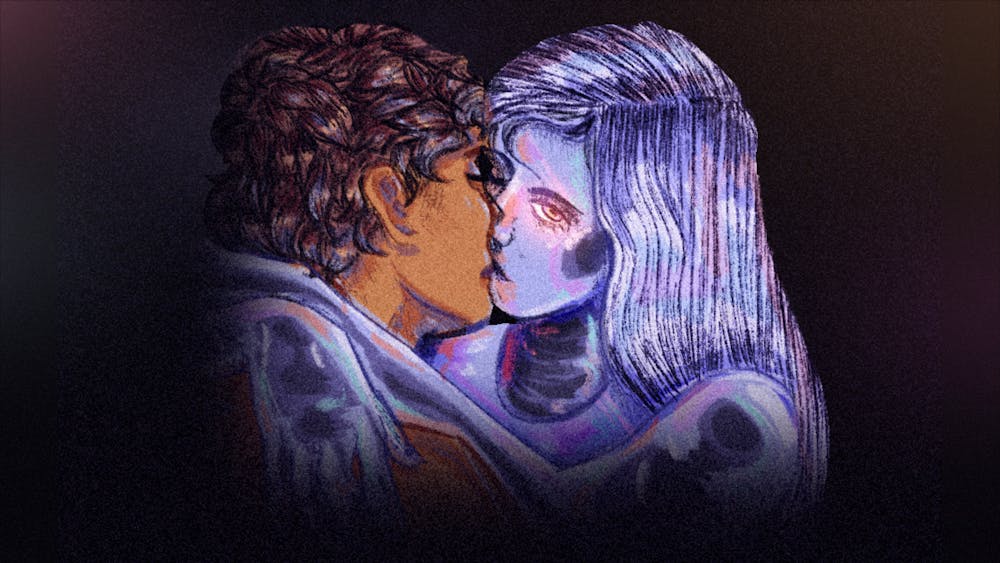Have you ever watched a TV show and become so immersed in the characters' stories that you cried for them? Maybe even had a crush on one of them? Humans tend to idealize and identify with many things. As kids we love and care for toys, as teenagers, we become obsessed with fictional characters. The emotions we experience with these lifeless objects and characters can mirror the feelings we have for real individuals. But what if a robotic companion could mean even more to humans? What if we could have sex with robots, or even fall in love with them?
The idea of falling for a robot isn't completely new. It’s seduced the entertainment industry for a long time, with movies like Ex Machina, I’m Your Man, and Artificial Intelligence garnering tons of interest and tons of money.
When the movie Her came out in 2013, the world was just beginning to consider the concerning effects of solitude in a hyper-connected world driven by technology. Her takes place in an alternative technological future that very much resembles our own, but where human–robot relations are the norm. The plot takes place in a Los Angeles marked by individualism and the intense flow and consumption of information, where protagonist Theodore falls in love with Samantha, a personal operating system. This was pretty out there in 2013, but just 10 years later, it seems to have predicted the technology that now drives waves of real–world speculation about our possible entanglements with the robotic world: artificial intelligence.
Although much more advanced, the intelligence in the movies works similarly to real ones, such as ChatGPT. The artificial intelligences that exist today are used for different purposes, such as image creation and virtual assistants, grammar checkers and even to create music and lectures. But life imitates art and AI’s are becoming even more complete and complex systems, programmed to develop subjectivities such as love and even sex.
The border between the real and the digital is being broken down day by day. A 23–year–old influencer named Caryn Marjorie recently introduced CarynAI, a voice–based chatbot marketed as a virtual girlfriend. This AI has a distinct voice and personality, participating in one–on–one conversations for several hours each day. The chatbot discusses plans, shares intimate feelings, and even engages in erotic conversations. CarynAI has amassed over a thousand "boyfriends" willing to pay $1 per minute for the experience of this virtual relationship.
Sex bots are on the rise, and companies like Realbotix are at the forefront. They are working on robotic heads that attach to anatomically silicone bodies. These bots, when linked to a corresponding app, can do more than just mimic human anatomy. For example, they can crack jokes and flirt. Another popular sex bot, Samantha (life imitates art again), emerged in 2017, created by Synthea Amatus. These bots are highly customizable, resembling the fascination with creating an ideal lover being. Buyers can choose body shapes, eye color, hair, breast size, and even hand–painted features like freckles and veining. The CEO of RealDoll, Matt McMullen, seeks to enhance his ‘silicon sculptures’ with AI to “create a genuine bond between man and machine.” These dolls can be programmed to remember the owner's preferences, from food and films to music and birthdays.
But robots reveal true human facets, such as violence and sexism. A Samantha doll was so severely molested by a group of men, it had to be sent back for repairs. This is a vivid example of how these dolls invite abusive treatment and reveal violent male behavior normalized by pornography culture. Sex robots, by eroticizing non–consent, contribute to making male violence appear more acceptable and even inevitable. They also illustrate the close relationship between patriarchy and capitalism, as the human–robot relations are built on ownership and objectification.
Beyond the fetishist ways in which AI and sex dolls are used, there are broad ways we can consider relationships—the strange, weird, and odd ways we connect with others. AI companions can provide much–needed company for those who are lonely or isolated and could even help improve a person’s mental well–being. AI might be changing not just how we think about sex in the future, but the entire spectrum of intimacy. And who is to say if that is a bad thing?
If even our romantic choices with human beings are difficult to explain, the human–machine interaction is even harder. Robots may seem to offer everything we might want in a partner, such as attractive body features and continuous devotion, but some things can’t be replicated by machines: intimacy, connection, and reciprocity. Falling in love with synthetic androids might become normal in a not–too–soon future, but it will also be accompanied by issues all too human.







